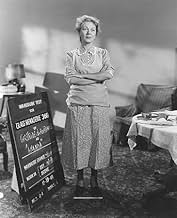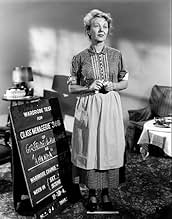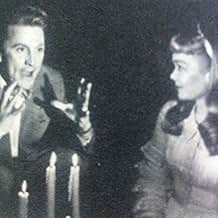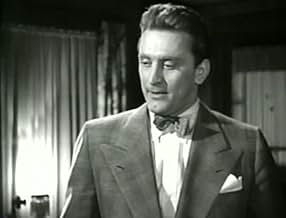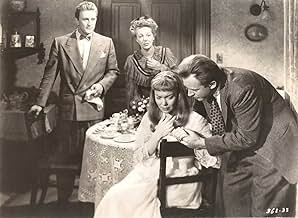IMDb RATING
7.0/10
1.3K
YOUR RATING
Merchant marine officer Tom Wingfield reminisces about his life in St. Louis where he had lived with his nagging mother Amanda and crippled shy sister Laura.Merchant marine officer Tom Wingfield reminisces about his life in St. Louis where he had lived with his nagging mother Amanda and crippled shy sister Laura.Merchant marine officer Tom Wingfield reminisces about his life in St. Louis where he had lived with his nagging mother Amanda and crippled shy sister Laura.
- Awards
- 1 win total
Philip Ahn
- Sailor
- (uncredited)
Chris Alcaide
- Eddie
- (uncredited)
Richard Bartell
- Barman
- (uncredited)
Peter Camlin
- Sailor
- (uncredited)
Perdita Chandler
- Girl in Bar
- (uncredited)
Victor Desny
- Sailor
- (uncredited)
Sarah Edwards
- Mrs. Miller
- (uncredited)
James Horne Jr.
- A Caller
- (uncredited)
Louise Lorimer
- Miss Porter
- (uncredited)
Sean McClory
- Richard
- (uncredited)
Featured reviews
The Glass Menagerie (1950) :
Brief Review -
Tennessee Williams' classic and perhaps the best story ever gets the best cinematic adaptation at the hands of Irving Rapper. Tennessee's Cat on a Hot Tin Roof and A Streetcar Named Desire may have been popular, but I found them a little overrated. Today, my thoughts are empowered by The Glass Menagerie (adopted 4 times), as I found this one much better due to its realistic take on life. As mentioned by many, this one is a close account of Williams' life with a deliberate happy ending, which is not fulfilled but bleak. Pardon me for saying this, but I found this film 'storyless'. There was no story. Just a few moments of a family together and their struggle/success and you have The Glass Menagerie ready for you. Yet, this one moved me and engrossed me as a viewer, which is a big thing. The film is about a caring mother who wants her son to be settled well and her sick daughter to be mingled with a handsome young man. The son is working at a warehouse and is sick of the job. He wants to explore and go places, but his mother keeps pushing him to bring young men to the house and find a partner for his crippled sister. The sister lacks confidence, while the mother is all about swag and royal stature. I couldn't have imagined that Gertrude Lawrence had the nerves to overshadow Arthur Kennedy, Jane Wyman and Kirk Douglas in a four-actor film. What a presentation of a caring mother, and what an accent she carried throughout the film. Simply unbeatable. Jane Wyman shines as Laura, and I can't imagine any other actress playing this role better than her. Arthur Kennedy and Kirk Douglas go hand-in-hand as far as male bonding is concerned, as well as individually. "Dancing is the most civilised form of social intercourse" has to be my favourite quote, apart from that final monologue by Tom. I'll always be thankful to Irving Rapper for "The Corn is Green" (1942), but I didn't like "Now, Voyager" (1942) much. This one landed exactly in the middle.
RATING - 7/10*
By - #samthebestest.
Tennessee Williams' classic and perhaps the best story ever gets the best cinematic adaptation at the hands of Irving Rapper. Tennessee's Cat on a Hot Tin Roof and A Streetcar Named Desire may have been popular, but I found them a little overrated. Today, my thoughts are empowered by The Glass Menagerie (adopted 4 times), as I found this one much better due to its realistic take on life. As mentioned by many, this one is a close account of Williams' life with a deliberate happy ending, which is not fulfilled but bleak. Pardon me for saying this, but I found this film 'storyless'. There was no story. Just a few moments of a family together and their struggle/success and you have The Glass Menagerie ready for you. Yet, this one moved me and engrossed me as a viewer, which is a big thing. The film is about a caring mother who wants her son to be settled well and her sick daughter to be mingled with a handsome young man. The son is working at a warehouse and is sick of the job. He wants to explore and go places, but his mother keeps pushing him to bring young men to the house and find a partner for his crippled sister. The sister lacks confidence, while the mother is all about swag and royal stature. I couldn't have imagined that Gertrude Lawrence had the nerves to overshadow Arthur Kennedy, Jane Wyman and Kirk Douglas in a four-actor film. What a presentation of a caring mother, and what an accent she carried throughout the film. Simply unbeatable. Jane Wyman shines as Laura, and I can't imagine any other actress playing this role better than her. Arthur Kennedy and Kirk Douglas go hand-in-hand as far as male bonding is concerned, as well as individually. "Dancing is the most civilised form of social intercourse" has to be my favourite quote, apart from that final monologue by Tom. I'll always be thankful to Irving Rapper for "The Corn is Green" (1942), but I didn't like "Now, Voyager" (1942) much. This one landed exactly in the middle.
RATING - 7/10*
By - #samthebestest.
It's hard for a production of a classic stage play not to be stagy. In the Windfield house we have the mother possessed with her children. She launches into diatribes relating to their shortcomings. Laura is crippled and shy and really has no social life. Her brother has a life of his own (event though he still lives in the family home), but is at the beck and call of the mother. She finally pushes him until he invites a friend to dinner. The object is to find a potential mate for Laura. It doesn't take a rocket scientist to see the potential pitfalls. This man is sensitive and understanding of the situation. That's as far as it goes, however. This is one of Tennessee Williams' finest plays, fraught with symbolism, submerged in despair. The fragility of glass is what this is all about. People are indeed breakable.
One of Tennessee Williams' best plays becomes a good but not great film despite a stellar cast. It's hard to pin exactly why this film doesn't soar but it's a solid screen version. Maybe it's just that the subject matter works better in a stage environment and that the camera is just too intimate.
Familiar story of restless son, his crippled sister, and their manic mother, who seems to live in the golden past is great material for the stage. And this sad story of the mother's attempts to goad the son into bringing home a young man to meet the sister seems rather cruel. But even the forgotten and lost can lead lives of desperation as they cling to dreams and make wishes on silver moons.
Arthur Kennedy stars as Tom, the son who tries to please his mother but longs to escape his dull job in St. Louis and see the world. Jane Wyman is the crippled sister who has shrunk from the world and collects tiny glass animals. Gertrude Lawrence is the mother who was abandoned by her husband and has been reduced to living in a dumpy apartment and selling magazine subscriptions. And Kirk Douglas is the "gentleman caller." All 4 actors are quite good, although none received Oscar nominations, despite the hype. Many great actresses have been associated with the role of Amanda Wingfield since this play made its Broadway debut in the 1940s: Laurette Taylor, Katharine Hepburn, Joanne Woodward, Maureen Stapletobm Jessica Tandy, Julie Harris, and Jessica Lange have all played the role on stage, film, or TV. And I swear I remember Shirley Booth doing this on TV also.
Ultimetaely the story is as fragile as the glass figures. If any one character dominates the story the whole play collapses. This film version works very well in balancing the roles. And while Wyman seems a tad old for the part, Lawrence was an even odder choice. I've also read that Bette Davis and Tallulah Bankhead were considered. But how they decided on Lawrence--a great musical comedy star in London and New York--is anyone's guess. She really is quite good but the film might have need the extra star power of Bette Davis.
Anyway, this classic American play is worth watching.
Familiar story of restless son, his crippled sister, and their manic mother, who seems to live in the golden past is great material for the stage. And this sad story of the mother's attempts to goad the son into bringing home a young man to meet the sister seems rather cruel. But even the forgotten and lost can lead lives of desperation as they cling to dreams and make wishes on silver moons.
Arthur Kennedy stars as Tom, the son who tries to please his mother but longs to escape his dull job in St. Louis and see the world. Jane Wyman is the crippled sister who has shrunk from the world and collects tiny glass animals. Gertrude Lawrence is the mother who was abandoned by her husband and has been reduced to living in a dumpy apartment and selling magazine subscriptions. And Kirk Douglas is the "gentleman caller." All 4 actors are quite good, although none received Oscar nominations, despite the hype. Many great actresses have been associated with the role of Amanda Wingfield since this play made its Broadway debut in the 1940s: Laurette Taylor, Katharine Hepburn, Joanne Woodward, Maureen Stapletobm Jessica Tandy, Julie Harris, and Jessica Lange have all played the role on stage, film, or TV. And I swear I remember Shirley Booth doing this on TV also.
Ultimetaely the story is as fragile as the glass figures. If any one character dominates the story the whole play collapses. This film version works very well in balancing the roles. And while Wyman seems a tad old for the part, Lawrence was an even odder choice. I've also read that Bette Davis and Tallulah Bankhead were considered. But how they decided on Lawrence--a great musical comedy star in London and New York--is anyone's guess. She really is quite good but the film might have need the extra star power of Bette Davis.
Anyway, this classic American play is worth watching.
As a result of the numerous re-makes of this haunting classic this original film version is often overlooked. Irving Rapper's delicate direction and economical style are the perfect compliments to Tennessee Williams' haunting prose. While Paul Newman's more recent filming of The Glass Menagerie with wife Joanne Woodward is more faithful to the play's text, his use of colour and a much weaker supporting cast makes the 1950 version more compelling viewing. The talented Karen Allen is not nearly as heartbreaking as Academy Award winner Jane Wyman in the crucial role of Laura. Arthur Kennedy and Kirk Douglas also out perform their more contemporary counterparts. Having now seen a number of actresses fail to live up to the considerable challenges of playing Amanda Wingfield it is easier to appreciate the virtues of the rather miscast Gertrude Lawrence(the film producers had wanted Tallulah Bankhead but felt her unfit to complete filming, they also wanted Bette Davis but her falling out with Jack Warner left her out of the running).According to Elia Kazan a nervous Charles Feldman re-cut the film thus somewhat compromising its integrity. However even with its flaws it is the only filmed version which fully captures the tragic atmosphere of Williams' brilliant play.
Gloomy and ponderous are the first words that come to mind when viewing this Warner film directed by Irving Rapper and starring stage star Getrude Lawrence as Amanda Wingfield. While this casting choice gives the film a novel touch, her performance--sometimes strong, sometimes subtle--is not enough to bring the story to vivid life.
Instead, it seems oddly stagebound despite Rapper's attempt to open it up occasionally. JANE WYMAN seems too old to convincingly portray the girl who is crippled socially and physically, as quiet and sensitive as she is. ARTHUR KENNEDY does well with the role of her restless brother (the sort of character he so often played) and KIRK DOUGLAS seems a rather odd choice to play the girl's suitor.
Somehow, none of it really jells.
The viewer is left with the impression that this must have seemed wonderful on the stage (since it was such a well-known hit by Tennessee Williams), but whatever ingredients made it sparkle as a play are sorely missing from the film. In the end, it seems nothing more than an artificial piece and the dialog is never laced with the gossamer effect of poetry that is usually associated with Williams' best works.
The pace is leisurely and never does the story seem vibrant enough to convince us that the events are really happening. Instead, we have an awareness that Jane Wyman is "acting" the role of Laura and Gertrude Lawrence is doing her best to tone down her stage mannerisms and give a natural performance as Amanda.
Summing up: Not the best of Tennessee's work on screen.
Instead, it seems oddly stagebound despite Rapper's attempt to open it up occasionally. JANE WYMAN seems too old to convincingly portray the girl who is crippled socially and physically, as quiet and sensitive as she is. ARTHUR KENNEDY does well with the role of her restless brother (the sort of character he so often played) and KIRK DOUGLAS seems a rather odd choice to play the girl's suitor.
Somehow, none of it really jells.
The viewer is left with the impression that this must have seemed wonderful on the stage (since it was such a well-known hit by Tennessee Williams), but whatever ingredients made it sparkle as a play are sorely missing from the film. In the end, it seems nothing more than an artificial piece and the dialog is never laced with the gossamer effect of poetry that is usually associated with Williams' best works.
The pace is leisurely and never does the story seem vibrant enough to convince us that the events are really happening. Instead, we have an awareness that Jane Wyman is "acting" the role of Laura and Gertrude Lawrence is doing her best to tone down her stage mannerisms and give a natural performance as Amanda.
Summing up: Not the best of Tennessee's work on screen.
Did you know
- TriviaIn his 1988 autobiography "The Ragman's Son," Kirk Douglas says that he thinks that the effectiveness of this movie was hampered by Gertrude Lawrence's vanity, since the filmmakers were obliged to add scenes that made her character look younger and more appealing. Douglas also says that he prefers the 1987 film version directed by Paul Newman.
- Quotes
Jim O'Connor: Ah, when you first meet Mendoza, you don't like him. But, when you get to know him, you hate him.
- ConnectionsFeatures L'insoumise (1938)
- How long is The Glass Menagerie?Powered by Alexa
Details
- Release date
- Country of origin
- Official site
- Language
- Also known as
- The Glass Menagerie
- Filming locations
- Production company
- See more company credits at IMDbPro
Box office
- Budget
- $1,357,000 (estimated)
- Runtime1 hour 47 minutes
- Color
- Aspect ratio
- 1.37 : 1
Contribute to this page
Suggest an edit or add missing content


